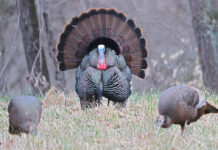Rain, rain, go away … come again another day.
We here in Tuscarawas County have certainly had our share of wet weather. It has put a damper on outside activities, farming and many other things.
One of the biggest and worst annoyances for me is the mosquito.
It almost seems like they are out early in the afternoon. Mosquitoes can carry different types of diseases and a mosquito bite can definitely result in an allergic reaction which can cause a secondary infection.
Diseases
As a matter of fact, according to the Ohio Department of Health, diseases people can get from mosquitoes in Ohio include:
• West Nile Virus (WNV)
• St. Louis Encephalitis (SLE)
• La Crosse Encephalitis (LAC)
• East Equine Encephalitis (EEE)
Disease is transmitted to humans when a mosquito bites an infected bird or mammal. These diseases can make people very sick.
It is recommended that you view the Ohio Department of Health website for more information at www.odh.ohio.gov.
Our local health departments spray for mosquitoes using a ULV sprayer and they also do larvaciding, which is adding chemicals to standing water to prevent eggs from hatching.
Mosquito disease can affect farm animals as well as human beings.
In Ohio in 2010, five human cases of West Nile Virus were reported and 25 horse samples were tested by the Ohio Department of Agriculture with one being positive.
Facts
Mosquito information:
• Eggs, larva and pupa must have water to develop.
• Mosquitoes can lay up to 400 individual eggs.
• Larvae feed on bits of organic matter in the water, and they become full grown in approximately one week.
• Female mosquitoes are ready to bite one to two days after reaching adulthood. Male mosquitoes do not bite.
Control
Water management (mosquito breeding sites) is essential for control. Eggs do not hatch unless they are in water. Any standing water that becomes stagnant is a prime breeding ground for mosquitoes.
Some things you can do to help prevent mosquitoes from breeding on your property:
• Screen your rain barrel
• Empty any containers that fill with water (pop cans, buckets, etc.)
• Keep your gutter clean so rain water can drain appropriately
• Fill in any holes on your property so they do not hold water — you can fill in the holes with gravel or soil.
• Fix any leaking outdoor faucets which cause standing water.
Bites
Recommendations to avoid the mosquito bite:
• Wear long sleeves and pants and keep skin covered when possible in addition to using appropriate repellents when outdoors.
• Know when the mosquitoes are most active — usually during the early morning hours and in the late evening hours.
• Keep them out of your house with screens on windows and doors.
• Mosquitoes rest in tall weeds/grass — keep mowed if possible.
Report any large areas of standing/stagnant water and any dead birds to your local health department.
If we all do our best at removing standing water, this will help eliminate a breeding ground for the mosquito and keep our children outside a lot longer.
(Tracy Haney is district program administrator for Tuscarawas Soil and Water Conservation District. Tracy has been with the district for more than seven years.)












